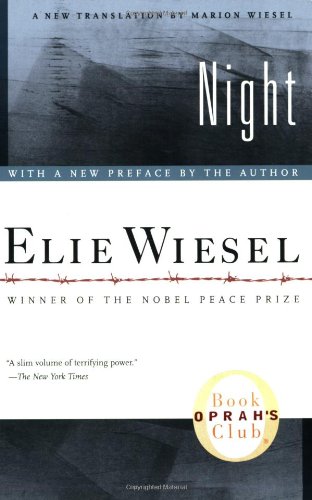All Nonfiction
- Bullying
- Books
- Academic
- Author Interviews
- Celebrity interviews
- College Articles
- College Essays
- Educator of the Year
- Heroes
- Interviews
- Memoir
- Personal Experience
- Sports
- Travel & Culture
All Opinions
- Bullying
- Current Events / Politics
- Discrimination
- Drugs / Alcohol / Smoking
- Entertainment / Celebrities
- Environment
- Love / Relationships
- Movies / Music / TV
- Pop Culture / Trends
- School / College
- Social Issues / Civics
- Spirituality / Religion
- Sports / Hobbies
All Hot Topics
- Bullying
- Community Service
- Environment
- Health
- Letters to the Editor
- Pride & Prejudice
- What Matters
- Back
Summer Guide
- Program Links
- Program Reviews
- Back
College Guide
- College Links
- College Reviews
- College Essays
- College Articles
- Back
Night by Elie Wiesel
I have read many books about the Holocaust. But none of them could be compared to this one. This story is composed of very personal struggles that the author, his family, and friends went through. Many of the situations that Wiesel faced were described with such accuracy and emotion; that caused the reader to have realistic images in their heads.
The author was a very religious young Jew at the beginning of the story. His connection to god varies throughout his experiences. Once he falls under the attack of the Nazis, he questions god, asking him how he could allow such terrible things to happen to those who believed in him so strongly. His father was one of those people who praised god, when Wiesel felt so religiously lost.
In this book, Wiesel is referred to as “Eliezer” which is his full name. His father is the only person to call him this while they’re within the quarters of several concentration camps, where a Jew is nothing but a number; if not anything less than that. It’s hard to think about someone following terrible orders from a terrible person, in such a willing matter. The sabotage that the Jews experienced in the camps was mainly composed of hard work. The consequence for not completing work, or not simply following orders, was death.
The first time Wiesel witnessed a murder, he was 16 years old. That’s not much older than myself, and I imagine that situation to be quite life scarring. He had to watch children, women, and men, being led through a path directed straight to death. He no longer gave thought to what had happened to his mother and sister, for it would crush him. He only cared for food, beverage, and his father. The only belongings he had left to care about.
I think that Wiesel was simply very confused about what was happening in his life. So much malignancy at one time, so many things happened so quickly, so many nights passed by without him noticing it. When you read some of the events of the story, you’ll find it hard to believe that the author survived. And you’ll be more surprised by how much he remembered, in order to tell us his unique story.
I would recommend this book to anyone, especially those who find the Holocaust interesting or enjoy bibliographies. Since Night by Elie Wiesel is nonfiction, I think it makes the story much more interesting. Rather than reading speculations based on research, you get a much better point of view of the different stages of the Holocaust. This book has become one of my favorite books, and I hope fellow readers enjoy it as well.
Similar Articles
JOIN THE DISCUSSION
This article has 5 comments.

1 article 0 photos 3 comments